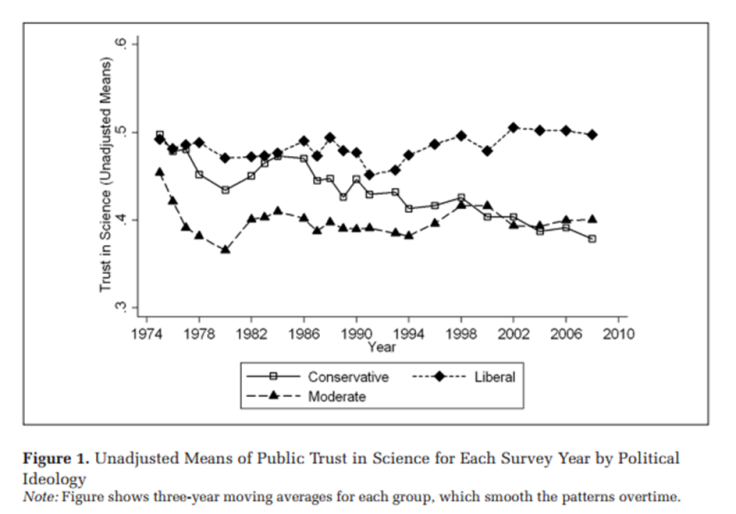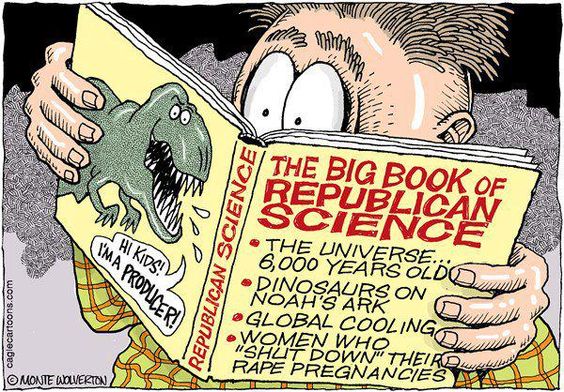There is a popular idea going around that public trust in science is declining. Evidence suggests that it is not. Instead, public views on science have become a function of political ideology or partisanship. The problem is not trust, it is politicization.
The new editor of Science, Jeremy Berg, gave this idea a boost when he told Times Higher Education that:
One of the things that drew me to this position…is there’s a crisis in public trust in science
But is the claim true? Evidence would suggest that it is not.The most recent NSF Science and Engineering Indicators asked the US public about confidence in different institutions. Since, 1973, science (along with the military) is one institution which has not seen a decline, as shown in the following figure.

Underlying these figures is a deeper story. Public trust in science has split along partisan line. The following figure, from a 2012 analysis by Gordon Gauchat (here in PDF) shows that public trust in science has declined among one group in particular — conservatives.
There has of course been much discussion of this trend, with a lot of attention focused on the cognitive or ethical limitations of self-identified conservatives. In contrast, there has been very little attention paid to the possible role of the scientific community in such a trend.
Matt Nisbet has documented that scientists (at least those who are AAAS members) overwhelmingly self-identify as liberals (more than black church goers) and Democrats (more than MSNBC viewers) as shown in the following graph.

In addition, scientists have become far more active in overt political advocacy over the past decade, which given their self-professed views, has been overwhelmingly in favor of liberal and Democratic causes.
This fact has not gone unnoticed, but is typically dismissed, because as everyone knows, reality has a liberal bias. But here is a thought question for you. What if the overt politicization of issues related (and unrelated) to science by scientists has had the effect to disaffect conservatives and Republicans? What if science is become, as Berg notes, “another special interest group“?
Is the politicization of science something to be reenforced and celebrated? Or should it be a concern of the research community? From where I sit, it is a concern.

August 23, 2016 at 12:09 pm
I think this is mostly a matter of shifting definitions in the US political landscape, not a problem you can blame on the scientific community.
From where I sit (the Netherlands), the US doesn’t seem to have many people with real ‘liberal’, or left wing, opinions. A large majority of Americans is what I would call conservative (Democrats) or ultra-conservative (Republicans). Because of that, everyone in the ‘reality based community’, is seen as liberal. But they are not necessarily liberal. They are just reality based. And that happens to be the cornerstone of science as well.
In a more reality based country, members of the scientific community will self-identify both as liberals and as conservatives. In the US, everyone who is not extremely conservative will self-identify as liberal – or skip the question. Very few scientists wil self-identify with a group that denies evolution and manmade climate change.
LikeLike
August 23, 2016 at 10:43 pm
Elmar, I live in the United States, am politically conservative, and know lots of others who are politically conservative. None “deny” “manmade climate change”. Most wonder about the extent to which man contributes to climate change — an unquestionably fair reservation, given the demonstrable scientific uncertainty on so-called “sensitivity” to CO2. They also balk at the many loose assertions in the media, for example — in the wake of the Louisiana flooding — that flooding events are increasing, when even the IPCC reported in 2013 that there is no evidence of increased flooding events on a global scale. (See Chapter 2). Another example: the frequent categorical assertions that sea level rise is accelerating, when the science on that issue is very complex (see last week’s Nature article on the topic, for example, which reported that satellite data shows deceleration, but theorized that it’s because of volcanic activity). This way of thinking — accepting the basic principle that man is changing the environment, but thinking critically about the extent and nature of the impact — is not somehow primitive or unintelligent, as you (and many others) seem to believe. If anything, it is primitive to think about this issue in terms of “accepting” or “denying” “manmade climate change”. If you are trying to show nuanced thought, and attentiveness to facts, talking that way isn’t a good way to do it.
LikeLiked by 1 person
August 24, 2016 at 9:24 am
Dear DC,
Who will you vote for in the next elections, then? The Republican party is led by hard core climate deniers. Not just Trump, every candidate who had a chance to become the nominee denies manmade climate change is real and something that requires action. No critical thinking there. Does that make you feel uncomfortable?
By the way, it should be obvious to you and anyone who takes a good look at the subject that the warming we see now is ~ 100% manmade, irrespective of climate sensitivity to CO2.
Human influence is to blame (not just CO2). There is no other plausible explanation. It’s really not that complicated. System Earth receives energy from the sun and a tiny amount from radioactive decay on its inside. Over the past 150 years, neither has changed significantly. Yet, the system is accumulating huge amounts of energy. The only logical explanation is that it radiates less of the energy it receives into space. How come? Can you provide a mechanism that is independent of human actions? A mechanism that has suddenly sprung into action at the very same moment humans are changing everything on this planet, but is totally independent of everything we do? I don’t think so.
LikeLike
August 24, 2016 at 3:36 pm
Wetenschap, you are off topic. Elmar characterized American conservatives — a large group which includes me — as “denying” “manmade climate change”. I explained why that is a crude oversimplification of American conservatives’ views on this complex issue. The exchange wasn’t about the views of political candidates, and anyway you’re wrong there too: I just now, in moments, determined that Jeb Bush, Chris Christie, Carly Fiorina, John Kasich, Bobby Jindal, and Lindsey Graham — all of whom ran for President (and the first of whom raised extraordinary amounts of money from conservative individuals and organizations) —
have acknowledged that man is impacting the climate,
albeit to an uncertain extent. This is clearly not a comprehensive list; I assembled it in minutes, doing the easy research you could have done before saying that “every candidate who had a chance to become the nominee denies manmade climate change is real.” Finally, you say that the current warming is 100 percent caused by man. You are mixing up concepts here. I referenced climate sensitivity — i.e., the extent to which the climate is likely to warm in response to any given quantum of anthropogenic emissions. You cannot credibly claim that there is scientific certainty on that topic. It’s an area of significant debate within mainstream science, and commonly expressed in ranges. As to the different issue of whether observed historical warming is entirely caused by mankind’s influences — which you have introduced to the discussion — your position is quite strange. Read the IPCC’s most recent report. Its contributors make no such claim about the period of “pronounced” warming in the first part of the 20th century (before CO2 emissions increased greatly in the 1950s), nor even about the period of warming starting in the second half of the 20th century. Have you read Chapter 10 of IPCC’s “Climate Change 2013”? That warming is 100 percent caused by man is not “obvious” to that group — why should it be “obvious” to me? Overall, you are proving my point: you and Elmar accuse a broad swath of Americans of absolutism,
and inattention to facts and details, but your own posts demonstrate both of those faults.
LikeLike
August 25, 2016 at 11:53 am
“Is the politicization of science something to be reenforced and celebrated? Or should it be a concern of the research community? From where I sit, it is a concern.”
Of course it is a concern. The diagram shows that AAAS members are as politically extreme as Mormon Church members and Tea Party members.
There is an organisation called Heterodox Academy that is trying to raise awareness of this problem. Originally it was set up by social psychologists including Jonathan Haidt and Lee Jussim, but they have recently invited academics from other fields to join up. I have done so and I would encourage Roger and others who share his concern to join too.
LikeLike
August 28, 2016 at 1:41 am
Agnostic? Few and far between. Most people are either theists or atheists who conflate logical domains.
Individual diversity rather than class diversity (e.g. racism, sexism). Positive progress. Individual dignity is one of two moral imperatives.
Avoidance to conflate logical domains and liberal assumptions (i.e. scientific mysticism) of uniformity, independence, and linearity. Unlikely believers in the prophecy of Catastrophic Anthropogenic Global Warming or its hedge: Climate Change.
Evolutionary processes (i.e. chaotic or incompletely/insufficient characterized and unwieldy) including human life from conception rather than the fantasy of “evolutionary creationism” or the article of faith “divine creationism”. Also positive.
Do they share the progressive/liberal belief in spontaneous conception akin to the divine intervention theory, that has rationalized the premeditated termination and cannibalism (e.g. Planned Parenthood) of over one million human lives annually in America alone for trivial, taxable, and luxury causes? No? Revolutionary! Uncivilized people tend to pull their religious/moral philosophies out of the twilight zone (a.k.a. penumbra). Intrinsic value is the other moral imperative.
I’ll have to review this alternative to the mainstream Churches, especially the State-established Pro-Choice Church (i.e. selective and arbitrary principles).
LikeLike